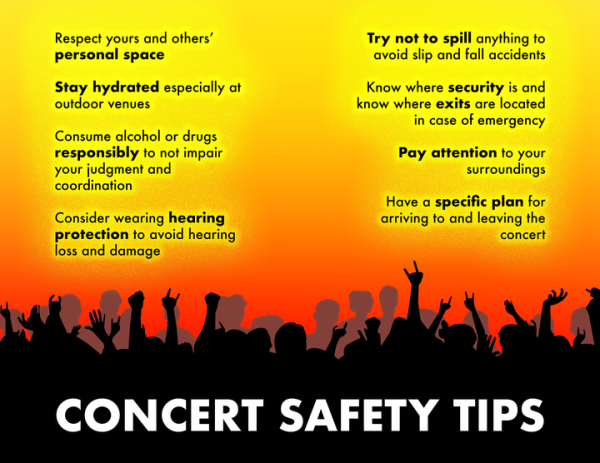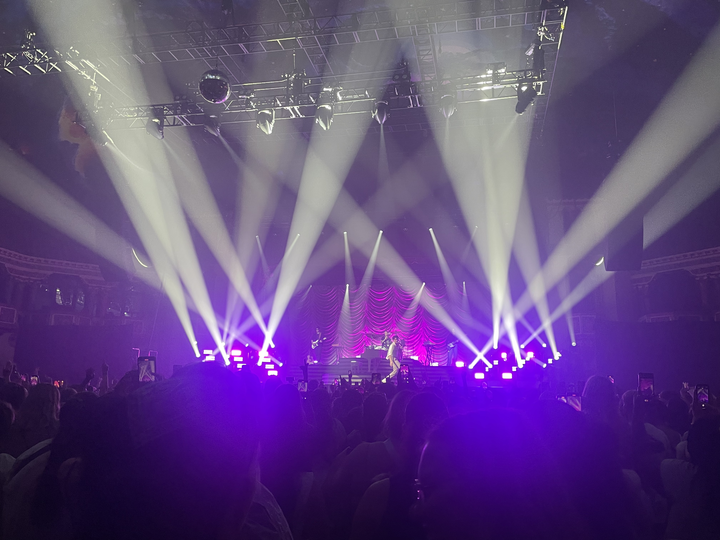Saturday, I attended singer Joshua Bassett’s concert in Chicago. Bassett suddenly stopped the concert a minute into performing his first song on the setlist because an attendee in the audience needed help.
Thankfully, security at the Chicago venue, Byline Bank Aragon Ballroom, was quick to respond to Bassett’s signal to help a girl in the audience, and after a few minutes, she was O.K. Bassett made sure he received confirmation she was okay before resuming his performance and asked security members if she needed water. Bassett also encouraged the audience to remember to breathe and drink water.
Throughout concert history, there have been numerous occurrences like this attendee’s experience over the weekend. Sometimes, people come out safely, but too often lives are lost or serious physical and mental health damages occur.
This is especially the case for larger concerts.
One of the bigger concert safety failures in recent years was the Astroworld Festival crowd crush. This festival was an annual musical event hosted by rapper Travis Scott at NRG Park in Houston, Texas. In November 2021, 10 people died, 25 people were hospitalized and over 300 people were injured as a result of Scott’s concert.
These deaths and injuries happened because the crowd was over capacity as they surged towards the stage. According to “The Texas Tribune,” Marty Wallgren, who had worked with Travis Scott, said, “he expected the gate rushes that helped swell the size of the crowd — Scott’s promotional team seemed to encourage them — and he told the festival’s minimum-wage security guards not to put themselves in harm’s way to stop them.”
Another big concert safety failure was the Manchester Arena bombing that took place at singer-songwriter Ariana Grande’s concert in May 2017. As attendees were leaving at the end of the concert, a suicide bomber detonated a satchel bomb, killing 22 people and injuring over 100 people.
According to a PBS News article in 2023, more prevention steps could have been taken to avoid these unfortunate injuries and loss of lives.
Sylvia Hui, reporter for “The Associated Press,” wrote, “Retired judge John Saunders, who led the inquiry into the Manchester Arena attack, said that one MI5 officer admitted they considered intelligence about suicide bomber Salman Abedi to be a possible national security concern but didn’t discuss it with colleagues quickly enough.”
Despite many occurrences of unsafe concerts, sometimes venues, security or artists can take measures to ensure the safety and well-being of a crowd.
This summer, Barracuda Music, the concert organizer for singer-songwriter Taylor Swift’s planned shows in Vienna, Austria, canceled shows after discovering a planned terrorist attack targeting the concerts. Thankfully, this threat was neutralized. According to AP News, Austria’s intelligence service worked closely with foreign intelligence services to capture the two terrorist suspects.
Fans who had tickets to the Vienna shows are mourning the loss of a show, not lives.
I think a big part of concert safety failures like Astroworld is the artist’s lack of responding to attendees’ signals for help. I understand artists aren’t always able to see or hear someone’s need for assistance, and security should be consistently checking on the crowd, but I think it’s partially the artist’s responsibility to scan their audience often so they can get security’s attention faster, especially in dire situations.
I also think, especially in minor issue scenarios, it is partially the responsibility of a concertgoer to keep themselves alert, hydrated and in a more open space.

Regardless, to anyone attending or involved in a concert or event with large crowds, everyone is responsible for looking after the safety and well-being of themselves and others.




